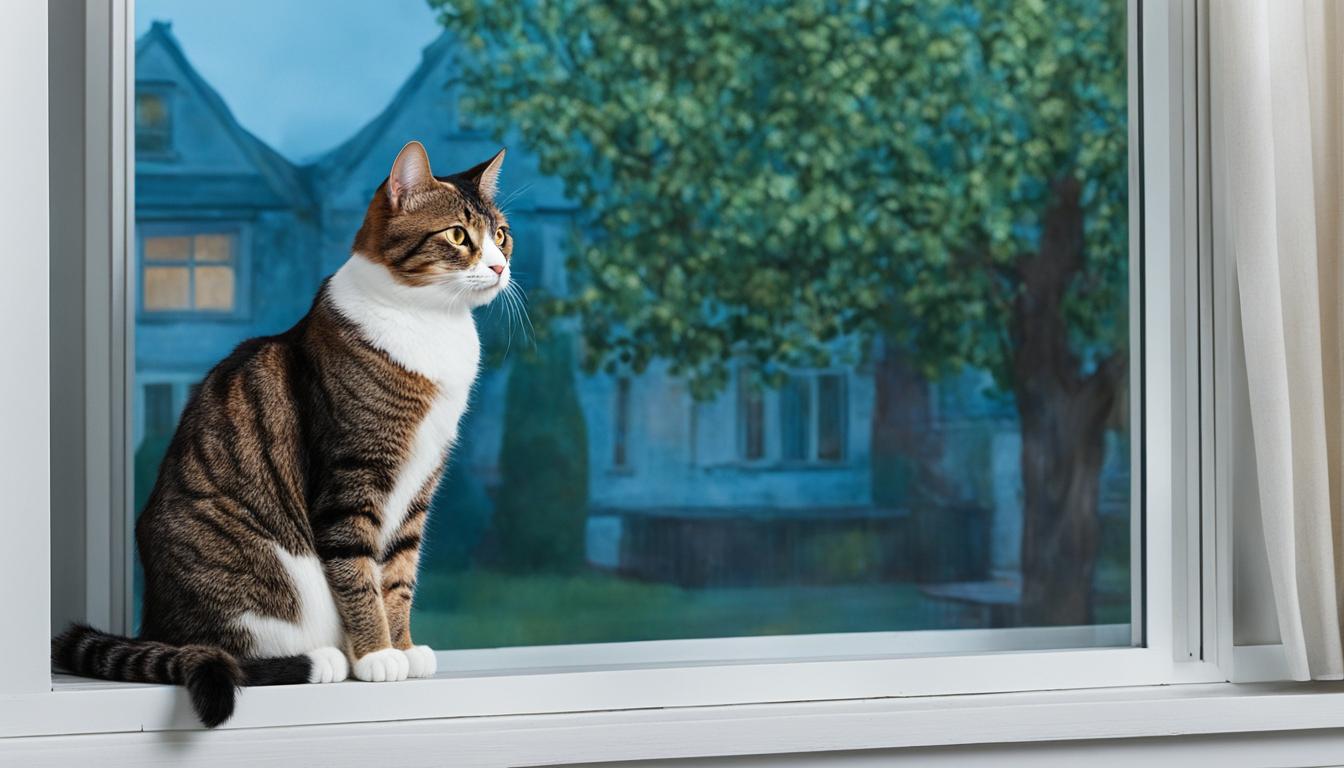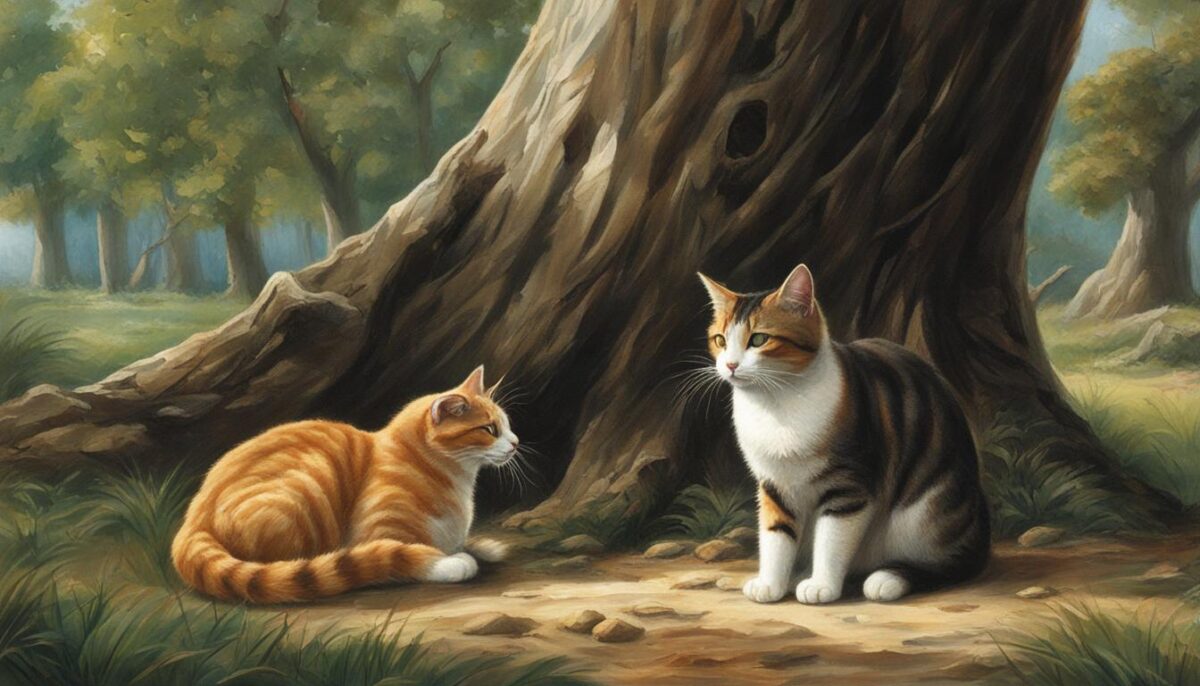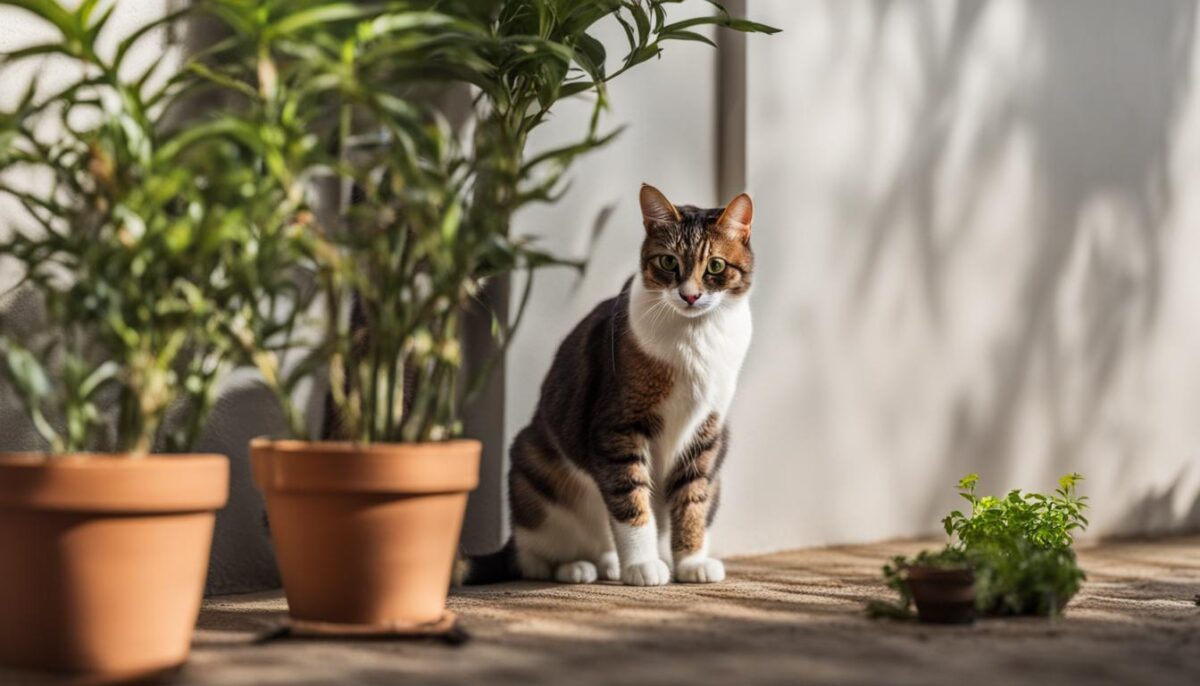Have you ever walked into a room and noticed a strange smell or seen wet spots on the walls or furniture that weren’t there before? If you have a cat, they might be trying to tell you something by spraying. Cats spray for many reasons, and it’s part of how they talk to each other without using words. They use urine marking as a way of saying “this is mine” and to feel safe in their home. When your cat sprays, they’re not being bad; they might feel stressed or want to say “keep out” to other cats. This is common with feline behavior and is a natural thing they do.
Your furry friend might be saying they saw a new cat outside or they don’t like a change in their home. Sometimes, cats that aren’t fixed spray more because they feel the urge to mate. This is called territorial marking. It’s important to understand cat spraying reasons and scent communication because it can help you help your cat feel better and stop them from spraying.
Key Takeaways
- Cats spray to talk without words and claim their space.
- Changes at home or new cats can make your cat spray.
- Both boy and girl cats spray, but it’s more common in those not fixed.
- Understanding why cats spray helps you and your cat live happily together.
- Helping your cat feel safe can reduce spraying.
Signs Your Cat Might Be Spraying
Hey there, have you noticed some new spots your cat is leaving behind? They may not just be accidents. Your furry friend could be trying to send a message through cat spraying signs. Let’s help you figure out if that’s what’s happening!
Distinguishing Spray from Regular Urine
Cats are tidy creatures, but sometimes they do something that seems odd, like spraying. Identifying cat spray isn’t too hard. Look for small amounts of pee on walls or furniture – that’s a key sign. When cats spray, they don’t squat like they do in their litter box. Instead, they stand up tall, lift their tail, and might even shake it. That’s their own way of feline marking.
Behavioral Indicators of a Spraying Cat
Now, let’s talk behavior patterns. If your cat is spraying, they might seem a bit more anxious or start hanging out in different spots than usual. It’s their way of saying, “This is mine,” especially if you have more pets around. Keep an eye out for your cat backing up to a vertical spot and twitching their tail – that’s a typical spraying pose.
Understanding Location and Smell Differences
The places and smell of cat spray are not like usual cat pee. You’ll know it when you smell it – it’s pretty strong because of the extra scent markers cats use. And instead of finding it on the floor, spraying usually appears up high on vertical surfaces. If you smell something super strong on the drapes or sofa, it could be a sign your cat is making that spot their own.
Let’s help you keep track. Here’s a table to make it easier to spot the differences between regular urine and spray:
| Regular Urine | Cat Spray |
|---|---|
| Found in litter box or on horizontal surfaces | Found on vertical surfaces like walls or furniture |
| A cat squats to pee | A cat stands with tail up, may quiver tail |
| Amount is larger and spread out | Amount is less and concentrated |
| Natural urine odor | Very strong odor due to scent chemicals |
Understanding these signs can help you figure out whether your cat is just going about their business or telling you (and other pets!) who’s boss in your home. Keep loving your kitty, and pay attention to these clues, so you’ll know how to make them feel comfy and secure without the need to spray.
Communicating Through Scent: Feline Social Structures
Have you ever wondered how your furry friends talk without making a sound? Cats are clever at using smells to chat with one another. This is a big part of what we call cat communication. When a cat rubs its face on furniture or people, it’s like writing a note that says, “I was here” or “This is mine!” This face rubbing is called scent-marking, and it helps maintain order and friendships among cats.
In a home with more than one cat, there might be no bossy cat like the leader of a dog pack. Here, the cat social hierarchy is subtle, more like a hidden rule book. If you see your cat spraying—a small pee on walls or furniture—it’s their way of saying, “This spot is mine.” It’s a bit like drawing a map of their land. Cats do this to avoid fighting and to feel safe in their feline territorial behavior. It’s their personal way of using scents to show who’s who and what belongs to whom.
To keep peace in a multi-cat house, it’s important to make sure each cat has its own space, toys, and bowls. If your cats seem upset, there are special sprays and diffusers that smell like friendly cat face-rubs, which can help everyone get along better. Less stress leads to fewer scents left for territory. So next time you see your cat sniffing around or rubbing its cheek on things, just know it’s their way of talking to the world!
Common Reasons Behind Feline Spraying
Have you ever come home to find your cat has sprayed? There are a few reasons why your furry friend might do this. It’s not just a stinky surprise; it’s a message!
Stress and Environmental Changes
Sometimes, cats spray because they feel stressed. Things like loud noises, moving to a new house, or changes in their daily routine can upset them. When cats are stressed, they might spray to feel better and say, “This place is mine!” It’s kind of like writing their name on their stuff.
Introducing New Pets or Family Members
Introducing a new pet or someone new in your family can make your cat spray, too. It’s pretty much like the first day at school when you want to make new friends but also miss your old ones. Your cat might spray to deal with their feelings about the new buddy.
Outdoor Cats Causing Indoor Marking
When other cats roam around outside near your house, your indoor kitty may smell them and think, “Hey, who’s that in my yard?” This can make your cat spray inside to make sure everyone knows this is their home. It’s like putting up a “No Trespassing” sign on their treehouse.
To keep your cat happy and their paws away from spraying, try to keep their environment calm and give them lots of love. Remember, when cats spray, they’re not being bad; they’re just trying to talk in their cat way!
Why Do Cats Spray: Territorial Behaviors Explained
Have you ever wondered why some cats will spray around the house? It’s a way for them to talk without using words – marking their special spots with a scent that says “this is mine!” This behavior is quite natural for them. So, let’s dig a little deeper to see why furry friends do this, especially when other cats are around.
The Effect of Intact Cats on Spraying
If your cat hasn’t been spayed or neutered, you might notice more spraying. These are called intact cats, and they spray mainly because of hormones that get them ready to find a mate. By fixing your cat – which means taking them to the vet for a small operation – you can lower the chances of spraying. It’s not a sure fix, but it helps a lot!
Gender Factors in Spraying Conditions
It’s not just about whether they’re fixed or not. Boys and girls can spray, but boy cats that aren’t neutered are the most likely to do it. Even after fixing, both boys and girls might still spray sometimes, but it’s usually less often.
Impact of Multi-Cat Households on Behavior
When you have more than one cat, it’s like having a house full of different personalities. They might not always get along and can be a bit competitive. Imagine if you had to share your favorite toy all the time! To help them share space more happily, it’s important to give each cat their food bowl and litter box. This can lower the need for territorial spraying and make for a peaceful home. Just by taking good care of your cats’ needs and feelings, you can prevent a lot of spraying.
FAQ
What are the primary reasons cats spray?
Cats spray primarily for territorial marking and communication. They may also spray due to feeling threatened, stressed, or an urge to mate. It’s a non-confrontational method for cats to signal others to keep their distance.
How can you distinguish cat spray from regular urine?
Cat spray is usually found on vertical surfaces and involves less urine than regular urination. Cats stand with their tail straight up, often quivering, as they spray, which is different from the squatting posture they use for normal urination. Additionally, spray has a stronger odor due to communication chemicals.
What are behavioral indicators that a cat might be spraying?
A cat might be spraying if you see it standing with a straight, possibly shaking tail, and backing up against a vertical surface. Unlike litter box use, where cats squat, spraying behavior involves standing upright.
How can scent-marking affect a cat’s social structure?
In the absence of a clear hierarchy, as seen in multi-cat households, cats may use passive-aggressive behaviors like spraying to establish their dominance and claim territory without direct confrontation.
What are common reasons behind feline spraying?
Common reasons for feline spraying include stress and environmental changes, such as moving to a new home, introducing new family members or pets, and the presence of outdoor cats invading their territory.
How can introducing new pets or family members affect a cat’s spraying behavior?
Introducing new pets or family members can be a stress factor for cats, prompting them to spray as a response to the changing dynamics in their environment. It’s their way of marking territory and coping with the new situation.
Can outdoor cats influence a cat’s decision to spray indoors?
Yes, when a cat detects the presence of outdoor cats within its perceived territory, it may spray indoors to mark its territory and ward off the potential intrusion.
How does being an intact cat affect spraying behaviors?
Intact cats, those who have not been neutered or spayed, are more likely to spray due to hormonal influences. Neutering can lessen the urge to spray and the strength of the associated odor, but it doesn’t eliminate the behavior completely.
Are there gender differences in cat spraying behaviors?
Yes, unneutered male cats are the most likely to spray. However, neutered males and both spayed and unspayed females may also spray, especially under stress or when territorial disputes are involved.
What impact do multi-cat households have on spraying behavior?
In multi-cat households, competition for resources like food and litter boxes can lead to spraying. Providing ample resources and maintaining a peaceful environment can help reduce spraying by decreasing competition and stress among cats.


